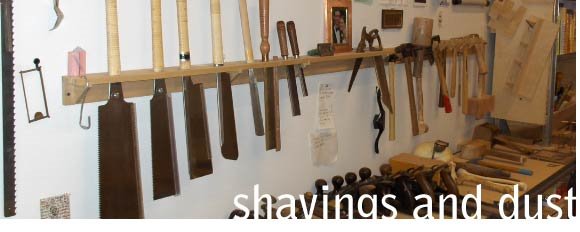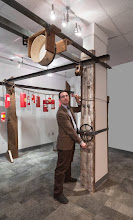There is a cigar store around the corner from where I work that sells the boxes for a dollar and donates the proceeds to charity, so that seemed good. For the tail piece (that holds the strings and the end of the neck by the box) and for the nut (the piece at the other end that holds the strings up off the fretboard up by the tuners) I went five blocks away to the Habitat Restore and got a used hinge and an old bolt. The wood for the neck is this beautiful long-leaf pine that was salvaged from a building two blocks from here from support beams that have been standing in pace for a hundred years. I wrote about that here. The thing that came from farthest away was the tuners and the bridge, the piece of wood that holds the strings up off of the box. They came from Beat Street Music in Manlius, twelve miles away. Beat Street is a great local guitar shop, with some really beautiful old and new instruments, and they do repairs as well, so the owner had some old tuners that had come off of some other guitars and an old bridge from a banjo. The tuners don't match and the bridge is a little worn, but they all work well. Here is the finished guitar:
And here is a detail shot of the tuners and the nut (which is a bolt. Which makes me smile):
And here is what it sounds like, the twelve-mile, two-hour, twenty dollar guitar:
Obviously I have some practicing to do, I don't really play slide guitar. But I can learn, and now I have something that I made myself to learn on. I have been listening to a lot of Mississippi Fred McDowell, so we'll see what rubs off.
The other outcome of this exercise, of course, is that it has been a thought experiment about resources and where they come come from and how they are used. Everything in this instrument could have been seen as trash. No one was going to buy those tuners from Beat Street. The cigar box could easily have been seen as waste. The lumber was slated for the landfill and the hardware ended up at the Restore because it was not wanted. But put them all in the same place in a particular way, and they become something very useful, and maybe even desirable. The easy thing to do when looking for a travel guitar would have been to drop a couple of hundred dollars on some mail-order thing that was made in China. But there are alternatives, and they can be pretty cool alternatives, with the bonus that there is an added layer of meaning on the object, an emotional layer that is created by taking the time to source locally and to make the object myself.





2 comments:
The nut is a bolt! hahahhahhahhhaahhaaaahhhh! i heart that. what can we build a fiddle out of?
zeke this sounds like a sitar. a very appalachian sitar.
Post a Comment